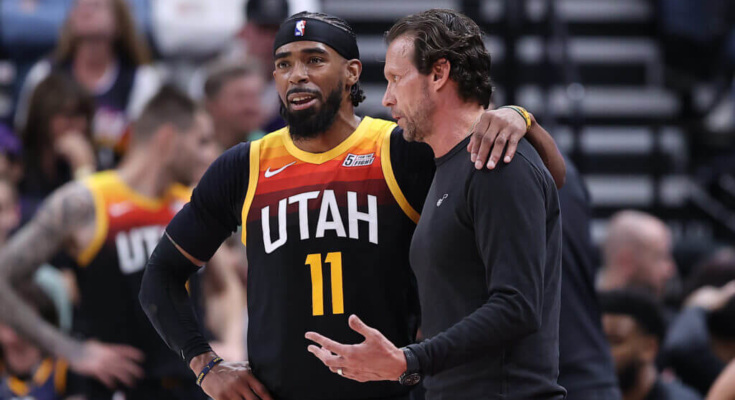This isn’t about Quin Snyder being on the hot seat.
Eight years into his tenure as head coach of the Utah Jazz, and with one guaranteed season left on his contract in addition to a coach’s option for the 2023-24 campaign, the 55-year-old remains highly regarded by everyone from second-year owner Ryan Smith to first-year basketball CEO Danny Ainge to general manager Justin Zanik. The Jazz’s series-ending loss to Dallas in Game 6 of their first-round matchup on Thursday doesn’t change that, and sources say ownership and management do not see Snyder as part of the problem.
Why, then, have we been talking about his possible departure from Utah for so many months now? Because it’s Snyder who must now decide how he feels about this Jazz experience and the prospect of continuing on this challenging path.
Sources say Snyder has been unsure of what his coaching future might hold all season, and his plan has been to see how things ended and then reassess his own view of it all from there. In terms of what might come next, it appears nearly every scenario is on the table.
He could be back with the Jazz, pursue a coaching job elsewhere or perhaps take a season off to re-energize and spend the kind of time with his family that is so hard to come by these days. In terms of a possible extension, sources say there were no discussions of a new deal during the season.
As is almost always the case with decisions like these, there are a number of nuanced factors in play.
There’s the obvious basketball component, with the Jazz’s inability to fulfill their own title-contending expectations taking its cumulative toll on all involved. For all the sustained success Utah has enjoyed, with six consecutive playoff appearances and more regular-season wins than all but Milwaukee and Toronto in that span, it failed to reach a conference finals and fell in the first round in three of the past four seasons.
That sort of playoff pain comes at a cost for all involved, especially the coach who is widely known for his relentless and exhausting approach to his craft. Add in the locker-room dynamics that have been front and center for so long now, the discussion about Donovan Mitchell and Rudy Gobert and whether they’ll ever truly mesh, and Snyder has found himself managing one of the league’s more sensitive situations for quite some time.
Looking ahead, it’s safe to assume Snyder would like to know what the Jazz landscape might look like — on the court and off— at the start of next season as well. What’s the plan here? Is Gobert still anchoring their defense, or will he be traded this summer? Is Mitchell still on board as the franchise centerpiece, or might he force his way out via trade despite having three more guaranteed seasons on his deal?
Who is truly in charge when it comes to the roster, and where does Snyder’s voice fit in when it comes to the type of team the Jazz want to keep building? After all, one could certainly argue Snyder has more sweat equity in this program than anyone.
It has been less than five months since Smith hired Ainge to work with general manager Justin Zanik and 10 months since longtime Jazz executive Dennis Lindsey resigned. Sources say Ainge and Snyder have worked together well so far, but it’s clear there’s still a getting-to-know-you component here that continues to evolve.
In his 18 years as the head of the Celtics’ front office, Ainge always took the kind of hands-on approach to team-building that required a healthy partnership with the coach. Zanik, meanwhile, is widely known to have a very good relationship with Snyder. Ditto for Snyder and Smith.
Snyder’s view of the position itself will likely come into play as well. It would be one thing if Snyder saw himself as the Jazz’s modern-day version of Jerry Sloan, the legendary late coach who spent 23 seasons in this seat. But those who know Snyder best, and who saw him hold five jobs in five cities and two countries (the United States and Russia) from 2007 to 2014 after his seven-year head-coaching stay at Missouri, say that has never been the vision he’s had for this job.
To hear Snyder reflect on this season Thursday night was to wonder what might come next for one of the league’s most respected coaches.
“I’m incredibly proud of this team and the way we competed tonight,” Snyder said during his news conference. “The result speaks for itself, but it’s been a pleasure coaching this group.”
Was the choice to go past tense some kind of sign that he was saying goodbye, or merely an acknowledgment that “this group” might be broken up in these next few months? Snyder himself may not know for sure just yet.
Related reading
Jones: 10 offseason questions for the Utah Jazz
Related listening
(Photo: Rob Gray / USA Today)


